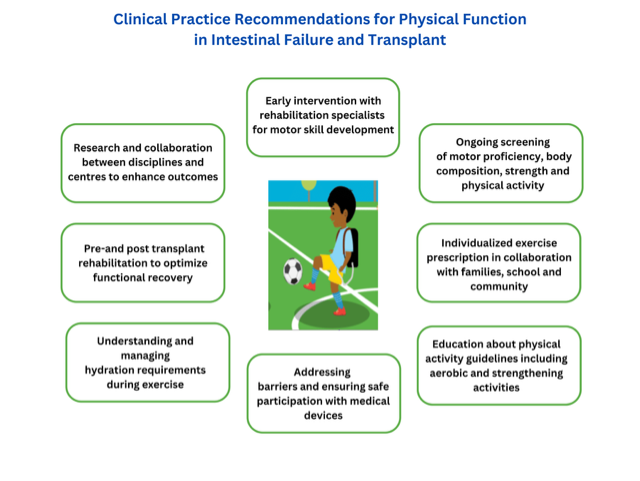
Practice recommendations to optimize physical function in pediatric intestinal failure and intestinal transplantation
Catherine Patterson1,2,3,4,5, Stephanie So1,2,3,4,5, Dianna Yanchis3,4,5, Jemma Mears6, Taru Palsa7, Dorsa Fathianpour2, Sydney Dempster2, Bianca Bondi5,8, Christina Belza3,4,5.
1Department of Rehabilitation Services, The Hospital for Sick Children, Toronto, ON, Canada; 2Department of Physical Therapy, Temerty Faculty of Medicine, University of Toronto, Toronto, ON, Canada; 3Group for Improvement of Intestinal Function and Treatment (GIFT), The Hospital for Sick Children, Toronto, ON, Canada; 4Transplant and Regenerative Medicine Centre, The Hospital for Sick Children, Toronto, Canada; 5Research Institute, The Hospital for Sick Children, Toronto, Canada; 6Physiotherapy Department, Birmingham Children's Hospital, Birmingham, United Kingdom; 7Helsinki University Hospital, New Children’s Hospital, Helsinki, Finland; 8Department of Psychology, The Hospital for Sick Children, Toronto, Canada
Background: Intestinal transplant (ITx) represents a life-saving treatment for children with intractable intestinal failure (IF). Surgeries and prolonged hospitalization may impact their motor development and physical activity, which is an important health behaviour for overall physical, social, and mental health. The aim of this position paper is to provide recommendations for optimizing physical function through supporting physical activity (PA), and exercise in children pre-and post-ITx.
Methods: A working group of the International Intestinal Rehabilitation and Transplantation Association Allied Health Committee conducted a literature review to identify relevant articles published between 2000-2023 that reported on physical function, body composition, muscle strength, and PA in a pediatric population (0-18 years) with IF or ITx. Key recommendations are based on scientific evidence and expert-informed opinion.
Results: Research indicates children with IF have altered body composition and lower levels of physical function, PA, and muscle strength compared to healthy peers. They also have a higher prevalence of motor delays, which persist even after ITx. There is a significant association between PA (steps per day) and increased % fat free mass and decreased % fat mass in children with IF and there is an increased risk of sarcopenia both pre-and post ITX. While studies in healthy children suggest that exercise could potentially improve all of these physical outcomes, parents of children with IF report unique barriers to PA including central lines and medical appliances.
Key practice recommendations are summarized in the infographic and include:
1) Early intervention with rehabilitation specialists in hospital and on discharge to the community.
2) Education related to PA guidelines including aerobic intensity and strengthening activities.
3) Provision of individualized exercise plans with communication and support in school/community settings.
4) Ongoing screening at out-patient visits to monitor body composition, strength, and PA.
5) Address potential barriers and safety issues. Each centre should establish its own guidelines around safe sport participation, ensuring families have the information they need to make informed decisions about their child’s potential PA and sport participation.
6) Pre-and post-transplant rehabilitation to ensure optimal functional recovery.
7) Prioritizing multi-centre research on PA benefits and effective interventions.
Conclusion: This position paper offers actionable steps for ITx teams to optimize physical function, PA, and exercise outcomes and highlights the need for research on exercise efficacy, safety, and intervention in this population.

[1] Physical function
[2] Intestinal Transplant